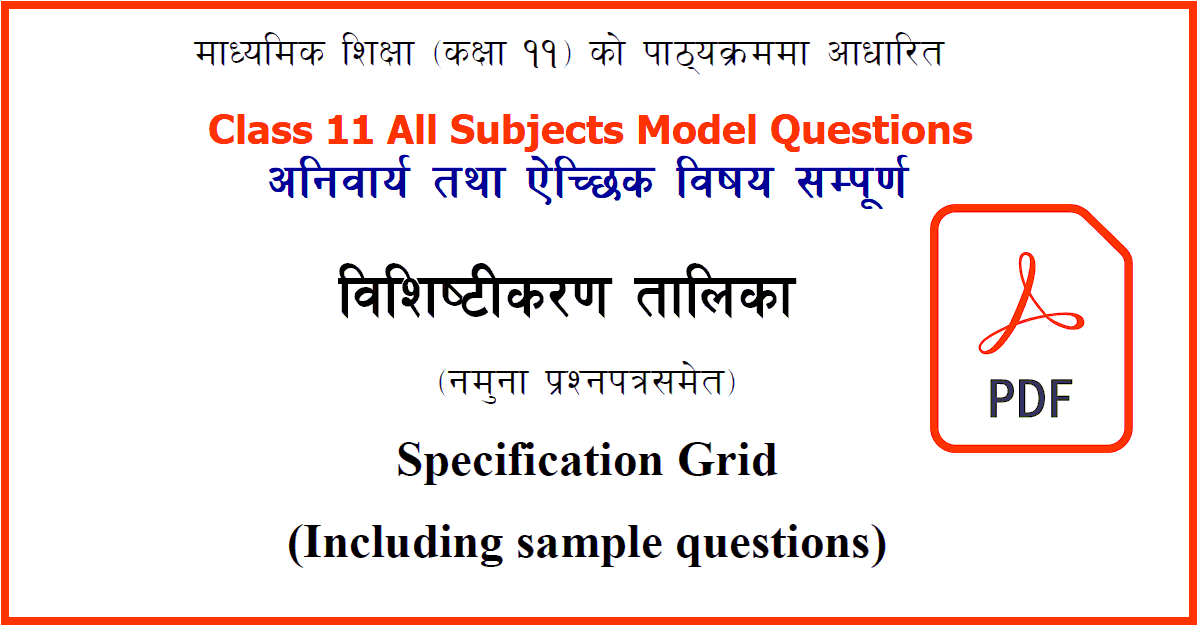
National Examination Board (NEB), Curriculum Development Center published Class 11 model questions (sample questions) with Specification Grid, please download the pdf of all subjects (compulsory and optional).
The course is a detailed plan for the development of knowledge, skills and attitudes, values ââ, and readiness required for the all-around development of the student. The quality of education can be enhanced only if the curriculum is implemented properly. The curriculum provides thematic specific objectives, content, teaching-learning activities, educational materials, teaching methods, and evaluation procedures, etc. Therefore, in order to make the teaching-learning process purposeful and effective, the teacher should make the curriculum the main basis or medium.
Appropriate assessment systems need to be used to make the learning facilitation curriculum effective.
It is necessary to make the evaluation process systematic and scientific in order to accurately evaluate the extent to which the objectives specified in the syllabus have not been achieved. The specialization schedule has been instrumental in making the evaluation process objective and objective. Therefore, a specialization schedule is created with the intention of implementing the curriculum properly and making the evaluation process more objective, reliable and valid.
The Secondary Education (Class 11 and 12) curriculum developed in accordance with the National Curriculum Draft for School Level, 2076, has been implemented from class 11 since the 2077 academic year. According to the syllabus, a specialization schedule for compulsory subjects to be taught in class 11 has been prepared and published in this way for external evaluation of students.
The use of the presented specialization table is expected to help increase the learning achievement rate of the student by making the examination simple and easy for the students.
A thematic draft task force comprising teachers and experts was formed to prepare this specialization schedule and sample question paper. The draft has been prepared in this way after further modification by the teachers' task force on the material prepared by the task force and after discussion and amendment in the concerned subject committee and coordination and editing committee.
The questions asked here are only sample questions based on the syllabus. It is advisable to formulate and use other questions without making any difference in the examination specialization schedule. The Curriculum Development Center expresses its heartfelt gratitude to the teachers of the concerned field, the experts of this center, the dignitaries of the concerned subject committee, and all the concerned parties for their assistance in its construction. If there is any shortcoming in it, constructive suggestions are expected from all concerned to make it more refined and standardized.
Compulsory Subjects:
- Nepali
- English
- Social Studies and Life Skill Education
- Mathematics
Optional Subjects:
- Physics
- Accounting
- Rural Development
- Jurisprudence Legal Theories
- Child development and learning
- Psychology
- History
- Gender Study
- Hospitality Management
- Human Value Education
- Biology
- Education and Development
- Geography
- Procedure Law
- Sociology
- Business Studies
- Language Science
- Population Study
- Dance
- Chemistry
- Economics
- Tourisum and Mounternaring
- Marketing
- Old age and care education
- Instrumental
- Constitutional Law
- Culture
- Fashion Designing
- Livestock, Poultry and Fish Farming
- Nepali (Optional)
- English (Optional)
- Cooking
- Applied Mathematics
- Business Mathematics
- Library and Information Science
- Home Science
- Environment Science
- General Law-I
- Finance
- Singing
- Computer Science
- Apiculture and Sericulture
- Beauty art and hairstyle
- Plumbing and Wiring
- Hotel Management
- Mass Communication
- Health and Physical Education
- Sports Science
- Social Studies and Life Skills Education





